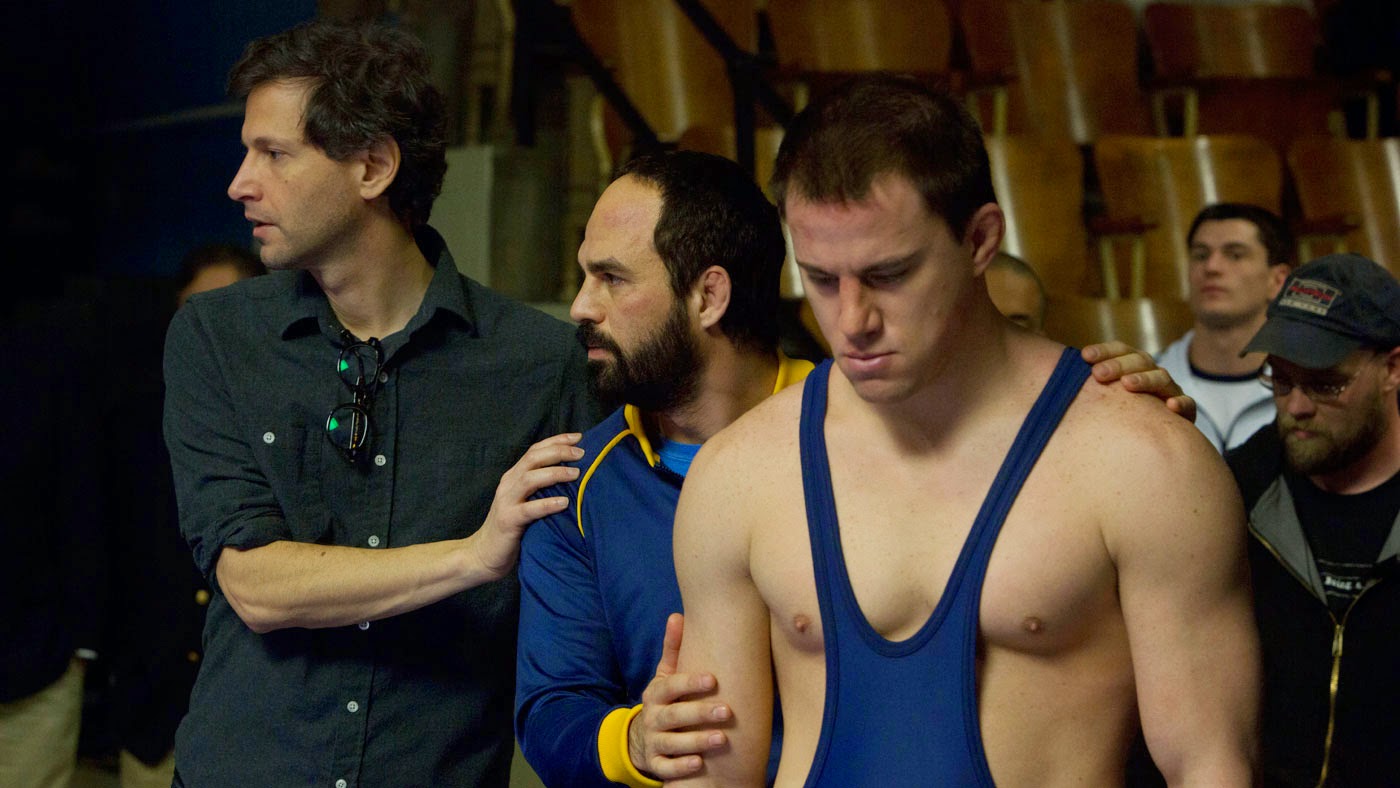'Foxcatcher' Review
Chasing the gold.
Film review by Isaac Handelman
Foxcatcher is director Bennett Miller’s follow-up to his 2011 hit Moneyball, and though both films reside in the sports biopic genre, the similarities end there. Foxcatcher is, by all accounts, a darker, more thematically mature film; its ability to consistently retain viewer interest in spite of its deliberate pace speaks to Miller’s increased comfort in the director’s chair since his last outing.
The film starts slow, though not detrimentally so. Viewers are given time to assimilate the drab life of pro-wrestler Mark Schultz (Channing Tatum), whose time since winning the Olympic gold medal in 1984 has been spent in training monotony, preparing for future competition under the shadow of his brother Dave (Mark Ruffalo). Screenwriters Dan Futterman and E. Max Frye subtly depict Mark’s feelings of inferiority to his brother during the film’s opening section, setting the stage for the drama to follow.
 Mark jumps on the opportunity to wrestle under the sponsorship of billionaire John du Pont (Steve Carell), whose creepy demeanor masks psychological turmoil that mirrors Mark’s own inner troubles. Carrell’s exaggerated mannerisms are overbearing at first, but his performance becomes more believable as du Pont’s character is further revealed. Though the role by nature doesn’t demand much range from Carell, it’s an impressive turn nonetheless from an actor primarily known for comedy.
Mark jumps on the opportunity to wrestle under the sponsorship of billionaire John du Pont (Steve Carell), whose creepy demeanor masks psychological turmoil that mirrors Mark’s own inner troubles. Carrell’s exaggerated mannerisms are overbearing at first, but his performance becomes more believable as du Pont’s character is further revealed. Though the role by nature doesn’t demand much range from Carell, it’s an impressive turn nonetheless from an actor primarily known for comedy.
Tatum is the dramatic standout of the film, naturally showcasing the intense emotions of a soul that’s been troubled since childhood. He’s an instantly endearing protagonist, and his chemistry with co-star Ruffalo results in a believable rapport between brothers Mark and Dave. Ruffalo himself delivers another strong performance, albeit in a role that’s less demanding than that of Tatum. Both brothers lumber around on-screen with unnatural, ape-like movements that don’t always come off as realistic.
As Mark is pulled in to du Pont’s twisted world, the wrestler develops an uneasy relationship with his supposed mentor. Miller’s shots linger, depicting the uneasiness of almost every interaction du Pont engages in. The director’s shots are beautifully framed, and often utilize unconventional changes in focus that succeed at turning Foxcatcher into a visually memorable film. The moody, minimalist score sets the mood well, though Miller often forgoes music altogether, letting his performers set the mood themselves.
With du Pont’s funding, the Schultz brothers set off on a course toward the 1988 Olympics, hoping to recapture their former glory of ‘84. Miller takes care to depict the sport in a vivid, exciting way, again showcasing his knack for sports direction. The sparring matches between Mark and Dave in particular are imbued with an impressive level of hard-hitting realism.
Still, viewers are likely to find themselves more engaged with the emotional tumult of Foxcatcher’s characters than with the sport they participate in. Mark’s relationship with du Pont eventually goes off the rails, his unhealthy dependency on the billionaire becoming apparent and disheartening as he’s nonchalantly tossed aside by the man he’d grown to love.
Viewers soon learn that du Pont’s need to live up to the legacy of his family dynasty, and to impress his own mother, outweigh all of the man’s other desires. du Pont is a man doomed from a young age to bring about his own destruction, and Foxcatcher depicts his downward spiral with an engaging, slow-burning intensity -- though ultimately, the film is more about the ripple effects on those unfortunate enough to have been surrounding du Pont at the time.
Foxcatcher is a tragic, cautionary, and fascinating multi-character study that doesn’t drill viewers with morals, instead letting its messages marinate until they’re impossible to stop thinking about.





Comments
Post a Comment